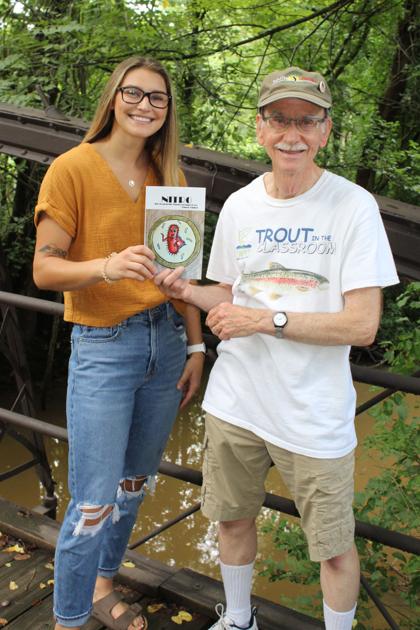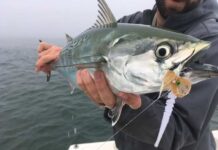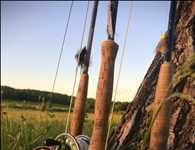Trout in the Classroom volunteer and author Chuck Dinkel has teamed up with illustrator Erika Lawson again to produce their second book, written for youth who participate in the Maryland Trout in the Classroom Program. The latest book is titled “NITRO, the Trout in the Classroom Super Hero” and features over 40 hand-drawn illustrations by Lawson.
Lawson’s playful caricatures of microscopic bacteria come to life on the pages of the book.
“Erika’s illustrations are what make the book so appealing to our young audience,” Dinkel said.
Lawson was an art student attending Middletown High School when she volunteered to illustrate Dinkel’s first book, “Mac: The Macroinvertebrate.” She is attending Frederick Community College and plans to pursue a degree in graphic design at the University of Maryland.
In this story, NITRO, a character whose name is synonymous with the bacteria responsible for the nitrogen cycle in a fish tank, introduces TIC students to his friends, SAPRO, SOMO, BACTER and SPIRA, who represent saprophytic, nitrosomonas, nitrobacter and nitrospira, respectively. These bacteria are crucial to help maintain the water quality that is essential to the survival of the trout the students raise in the classroom.
Bacteria play an important role in converting fish and food waste to ammonia, ammonia to nitrates and nitrites to nitrates. Dinkel’s book explains in simple terms the basic physical, chemical and environmental factors for bacteria to exist. Young readers gain a better understanding of the chemical and biological processes that take place in their trout tanks and the role these important bacteria play in nature.
Trout in the classroom
Trout in the Classroom is a very successful educational program sponsored by Trout Unlimited, a nonprofit national conservancy organization that is recognized for its stewardship of America’s rivers and streams. TIC programs have been in place in classrooms all across the country. By participating in the TIC program, students from grades K-12 are learning about the importance of water quality in over 5,000 classrooms in 35 states.
The students make connections with their local watershed by raising trout from eggs to fingerlings and then releasing them in clean and cold streams each spring. TIC is a collaboration between volunteers, government agencies and local organizations including Trout Unlimited.
Wildlife connectivity
Although the daily nurturing of young rainbow trout as they grow from eggs into fingerlings teaches students responsibility, the TIC program provides valuable insights about the importance of wildlife and habitat conservation.
Through the TIC educational program, students become engaged in stream habitat study and begin to understand the implications of wildlife connectivity on the ecosystem. Protecting headwaters, springs and isolated wetlands as a source of invertebrate life enables ecosystem connectivity, the flow of natural processes that sustain life on earth and ultimately contribute to our human well-being.
Trout are delicate creatures that thrive best in clean and cold waterways. Although rainbow trout are not a native species in Maryland, they are representative of the native brook trout species found in the Frederick City Watershed. The loss and fragmentation of habitat from human development as well as from natural events such as drought, wildfires and flooding are key threats to wildlife populations that rely on water quality.
A true conservation hero
Dinkel is a member of the Potomac-Patuxent Chapter of Trout Unlimited in Maryland. He serves as one of the two coordinators for the state’s TIC program. His professional career as an electronics engineer spanned 30 years and included employment with the Naval Oceanographic Office, National Oceanic and Atmospheric Administration and the National Institute of Standards and Technology.
Dinkel covers Frederick, Washington and Montgomery counties primarily in his TIC efforts. The program is run in approximately 25 Frederick County schools each year. Dinkel spends thousands of hours of his personal time volunteering when he is not fly fishing or working in his garden. He is assisted by lead TIC volunteers in other counties and the Frederick County Public School teachers who participate in the program.
“The difference between TIC volunteers and doctors is that we still make house calls,” Dinkel quipped. “If somebody calls us for assistance, we will be there.”
Copies of Dinkel’s books can found on amazon.com.
Credit: Source link































